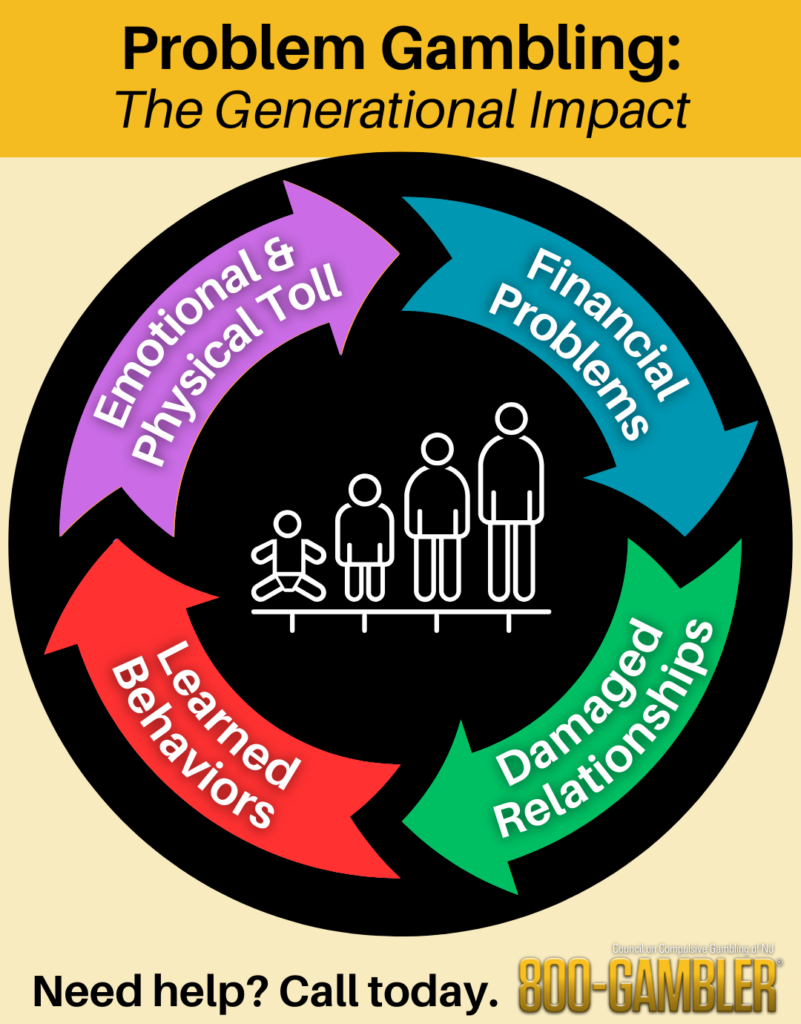Problem gambling is not just a personal battle; it’s a hidden but dangerous issue that often leads to devastating consequences spanning generations. When left unaddressed, a person’s gambling problem can shatter family structures, damage important relationships, and perpetuate cycles of financial instability and emotional turmoil. This article will explore the generational impacts of problem gambling, a topic often shrouded in silence and stigma. Let’s take a closer look at how problem gambling can negatively affect not just an individual but their young family members as well.
The Generational Impact of Problem Gambling

Emotional & Physical Toll
The stress and emotional strain that problem gambling places on a family can be devastating. Living with a problem gambler can be chaotic and stressful for children. They may witness arguments, violence, and the constant fear of financial instability. As a result, they’re more susceptible to developing high levels of anxiety, depression, and other mental health issues. Turmoil at home can also hinder a child’s ability to focus on their studies and engage in extracurricular activities, affecting their long-term educational outcomes.
Beyond mental health, the next generation’s physical health can be affected by problem gambling as well. Stress-related health problems are common among problem gamblers and their family members. These issues, such as heart disease and hypertension, can be passed down to future generations due to genetic predisposition and an environment of chronic stress.
Financial Legacy
It goes without saying that a gambling problem can lead to severe financial hardship. People struggling with problem gambling may deplete savings, accumulate debt, or lose assets, which affects their family’s financial stability. The financial legacy of problem gambling can leave a family with significant debts and a tarnished credit history, making it difficult for children to plan for the future or access educational opportunities later in life.
Damaged Relationships
Families dealing with problem gambling often develop a culture of secrecy and shame. Deception, lies, and secrecy often accompany gambling behavior, damaging the bonds between family members. In addition, the shame of dealing with a gambling problem can perpetuate a cycle where individuals avoid seeking help, and the problem remains hidden, making it difficult for future generations to address the issue openly.
Problem gambling can have a variety of legal implications that affect both the individual and their children. In some cases, those struggling with serious gambling-related debts may engage in criminal activities to sustain their habits, leading to incarceration or other serious consequences.
Learned Behaviors
Children learn by observing the people who raise them. When a parent or guardian struggles with problem gambling, it sets an example for their children. They may grow up believing that excessive gambling is a normal and acceptable way to cope with stress or financial problems. In turn, they may also learn and adopt similar behaviors, thereby perpetuating the cycle.
Breaking the Cycle
Breaking the generational impact of problem gambling is challenging but essential. Here are some steps that can be taken to begin disrupting this negative feedback loop:
- Professional Help: Seeking professional help is an important part of breaking the cycle of problem gambling. Whether you have an unhealthy relationship with online gambling, trading, or courtsiding, various evidence-based treatment options — such as cognitive behavioral therapy and support groups like Gamblers’ Anonymous — can assist in recovery.
- Family Support: Family members can play a crucial role in encouraging the individual to seek gambling treatment. Open communication and understanding are vital in this process.
- Education: Teaching children about the risks and consequences of a gambling problem can help them make informed choices and avoid falling into the same trap. It’s also important to discuss what responsible gambling habits look like. This may involve setting limits on how much time and money is spent on gambling, avoiding gambling as a way to cope with emotional distress, and seeking help if gambling begins to interfere with daily life.
- Access to Counseling: Children who have been affected by a parent or guardian’s gambling problem should have access to counseling and support services to address their emotional trauma and help them heal.
Make a Change Today
The repercussions of problem gambling extend far beyond the individual, infiltrating family dynamics, financial stability, and emotional well-being of successive generations. By illuminating its far-reaching effects, we aim to foster understanding, encourage dialogue, and ultimately contribute to strategies that can break the chain of this destructive behavior.
Remember, the chains of problem gambling can be broken, but it requires collective will, compassion, and action. If you or a loved one is struggling with a gambling problem, call 800-GAMBLER today. Our toll-free, confidential helpline is open 24/7, and we are here to help. Give us a call today and take a step toward positive change!



